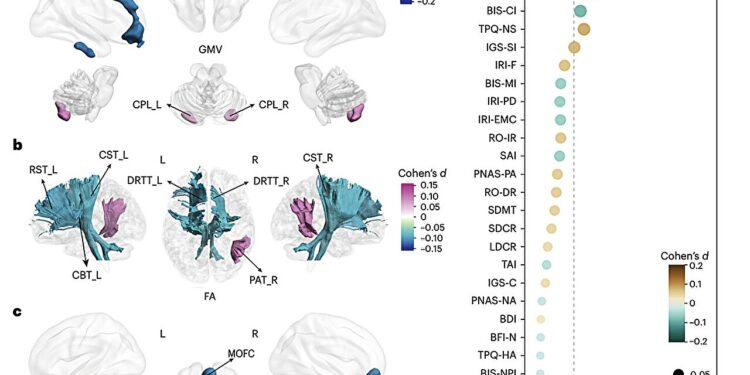Brain imaging and behavioral differences between participants with and without brothers and sisters. Credit: Nature Human behavior (2025). DOI: 10.1038 / S41562-025-02142-4.
Statistics suggest that the size of families in many countries shrinks and that an increasing number of parents in the world do not end up having a single child. While many psychology studies have explored the differences between people who have brothers and sisters and those who do not, the effects of not having brothers or sisters on the brain and the behavior of people are not yet fully understood.
Previous research has given variable and sometimes contradictory results, which has sometimes referred to negative effects to be a only child and other times have highlighted his positive implications. In addition, these negative and positive effects have proven to be inconsistent between studies, some studies suggest that only children tend to do better at school, are more pro-social and less problematic, while others have shown the opposite.
Researchers at the General Hospital of the Medical University of Tianjin and other China Institutes recently carried out a study aimed at better understanding how to be a single child affects the brain and the behavior of people in adulthood. Their results, published in Nature Human behaviorHighlight specific models in the development and activity of the brain, as well as behavioral trends, which are commonly observed in adults who grew up without brothers and sisters.
“With the global increase in families only children, it is crucial to understand the effects of growth without brothers and sisters (GW) on the adult brain, behavior and underlying ways,” wrote Jie Tang, Jing Zhang and their colleagues in their article.
“Using the Chimgen cohort, we studied GWS associations with the structure of the adult brain, function, connectivity, cognition, personality and mental health, as well as the GWS path to growth environments linked to GWS in the brain and the development of behavior, in 2,397 pairs of individuals with and without brothers and sisters well suited to covariables.”
The researchers analyzed the data collected as part of the study of Chinese imaging genetics (CHIMGEN), which was carried out in 32 research centers in China. They organized the participants who met the criteria for selecting their study in pairs, which contained a single child and a person with brothers and sisters who had demographic data and similar history.
By comparing the brains and behaviors of these pairs of participants, the researchers were able to obtain new information on how a lack of brothers and sisters affects the brain and the behavior of people in adulthood. Interestingly, they discovered recurring patterns among children only in the integrity of the white substance, the volume of the brain, neural activity, memory and mental health, while revealing characteristic behavioral phenotypes (that is to say cognitive, personality and behavioral tendencies).
“We have found associations connecting GWS to a higher linguistic fiber integrity, a lower motor integrity, a larger cerebellar volume, a smaller brain volume and a lower spontaneous brain activity,” wrote Tang, Zhang and their colleagues.
“Contrary to the stereotypical printing of associations between GWS and problematic behaviors, we have found positive correlations of GWS with neurocognition and mental health. Despite direct effects, GWS affects most of the brain and behavioral results through modifiable environments, such as improving children’s growth, maternal care and family support, suggesting targets Interventions to improve the healthy growth of children. ” “”
This recent study suggests that if being a only child can have direct effects on the brain and the behavior of people, most of its effects are linked to the environment in which only children grow and to the stimuli to which they are or not. This suggests that carefully designed interventions aimed at expanding the experiences and opportunities available for children only could help improve their brain, mental health and behavior as an adult.
More information:
Jie Tang et al, how to grow without brothers and sisters affects the adult brain and the behavior in the cohort of Chimgen, Nature Human behavior (2025). DOI: 10.1038 / S41562-025-02142-4.
© 2025 Science X Network
Quote: The study explores the impact of growth without brothers and sisters on the brain and the behavior of adults (2025, April 21) recovered on April 21, 2025
This document is subject to copyright. In addition to any fair program for private or research purposes, no part can be reproduced without written authorization. The content is provided only for information purposes.



